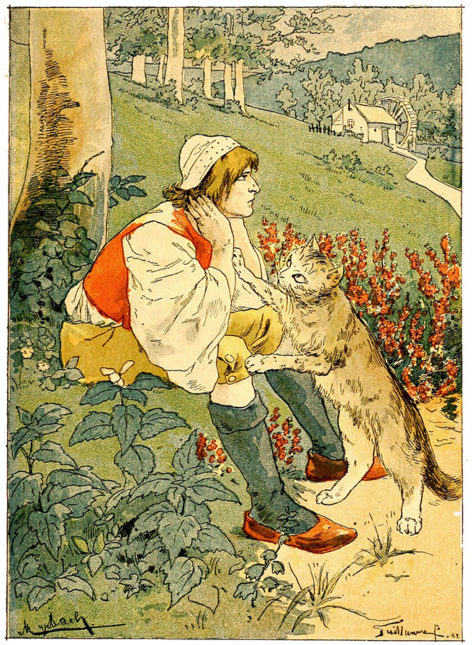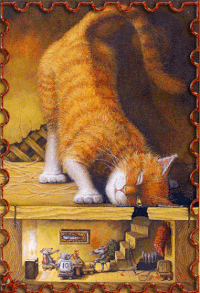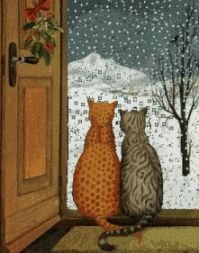Gagliuso and His Cat
The familiar “Puss in Boots” story originally came from India and there were four different versions (discounting minor variations) between the early 16th century and middle of the 18th century. The most famous version was written by Charles Perrault in the l590s. Gagliuso is a version written in the early 1500s by Gianbattista Basile and ends very differently from the more familiar Perrault version.
A Fairy Tale From The Pentameron
Once upon a time there lived in Naples a poor old man named Gagliuso, so squalid and destitute that he was as naked as a worm. Feeling himself at the point of death, he said to his two children, Oratiello and Pippo, “My sons, I am summoned to pay the debt of nature. Believe me, Christians as you are, that my only regret in quitting this sad abode of toil and pain is that I leave you without a farthing. Alas! you will have less than a fly could carry off on his foot. I have led a dog’s life; I have dined off an empty stomach, and gone to bed in the dark. But in spite of all, I wish on my deathbed to leave you some token of my love. Oratiello, my firstborn, take that wallet hanging on the wall, and may you find in it every night what I have often sought in vain all day, a crust of bread. As to you, my youngest, take the cat. My children, remember your dear father.” With these words, he burst into tears, and a little while after said, “Farewell, it is night.”
Oratiello buried his father at the public expense; after which he plucked up his courage, and went down to the bay to help the fishermen draw the seine. But Pippo, looking at the cat, cried, “See what a fine legacy my father has left me! I cannot keep myself, and here I have two mouths to feed!”
The cat heard these lamentations, and remarked, “You complain without cause, and have more luck than sense. You do not know your good-fortune, for I can make you rich if I set about it.”
Pippo felt that she was right. He stroked the cat three or four times, and warmly besought the favour of Dame Puss, who took compassion on the poor lad. She went out every morning, to the bay, or the fish-market, where she managed to lay hold of some large mullet or superb sword-fish, which she carried to the king, saying, “Your majesty’s slave, Signor Gagliuso, sends this fish, with his compliments, as a small gift to a great prince.” Upon which the king, with the pleased air of one receiving a present, would answer, “Tell this stranger gentleman that I am infinitely obliged to him.”
Another time the cat would scour the fields and marshes, and when the hunters shot down a blackbird, lark, or woodcock, would snatch up the game, and hurry with it on the same errand to the king. She used this artifice so long that at last, one morning, the king said, “I am under so many obligations to Signor Gagliuso, that I should like to make his acquaintance and thank him for all his courtesy.” The cat replied, “Signor Gagliuso’s blood and life are at your majesty’s disposal. My master will wait upon you tomorrow morning without fail.”
Morning having come, the cat hastened to the king, crying, “Signor Gagliuso begs you to excuse him for not presenting himself before you. Some of his rascally valets ran off with his clothes last night; the thieves have not left him a shirt to his back.”
On hearing this, the king ordered a quantity of linen and wearing apparel to be taken from his own wardrobe and sent to Gagliuso. Before two hours had passed our hero entered the palace, escorted by the cat. The king received him most graciously, and seating him by his side, ordered a magnificent feast to be served him.
While they were at dinner, Gagliuso turned from time to time to the cat, and said, “Look here, Puss, keep an eye on our things!” to which she answered, “Hush! hush! don’t speak of such trifles.” The king asked what troubled Gagliuso, whereupon the cat said that he would like a small lemon, when the king sent to the garden for a whole basketful. But Gagliuso continued to repeat the same thing, while the cat tried to hush him, and when the king insisted upon knowing what was the matter, invented one excuse after another to conceal her master’s meanness, in thinking that anyone there would be likely to steal his hat and cloak.
At last, after sitting long at the table, talking of one thing and another, Gagliuso asked permission to withdraw. Left alone with the king, the cat extolled her master’s merit, wit, and good sense, and above all, the immense wealth that he possessed in the Roman Campagna and Lombardy. He was just such a son-in-law as a crowned head might desire.
The king, asking what his fortune might be, the cat declared that it was impossible to reckon the value of the goods and chattels of this Croesus, who did not know himself what he was worth. But if the king wished to be sure, it was a very easy matter; he had only to send some trusty messengers across the frontier, and they would learn for themselves that there was no wealth in the world like Gagliuso’s.
The king summoned his faithful counsellors, and ordered them carefully to inquire into the affair. They followed the cat, who, as soon as they had crossed the frontier, ran on before, on the pretense of preparing refreshments. Wherever she found a flock of sheep, cows, horses, or swine, she said to the shepherds, or keepers, “Look here! there is a company of robbers coming to plunder everything they find. If you wish to escape and save your property, you must say, ‘All this belongs to Signor Gagliuso!’ and they will not touch a hair.”
She repeated the same thing at all the farms along the way, so that, wherever the king’s messengers went, they heard the same song. All that they saw belonged to Signor Gagliuso. Tired of asking the same question, they returned to the king and told him wonders concerning Signor Gagliuso’s possessions. On hearing this the monarch promised the cat a heavy fee if she would make the match, and her friendly tongue bobbed back and forth like a shuttle till it had woven the whole intrigue. Gagliuso offered himself, and the king gave him a fat dowry with his daughter.
After a month’s merry-making Gagliuso told his royal father-in-law that he wished to carry his bride to his estates. The king accompanied them as far as the frontier, after which they went to Lombardy, where, by the cat’s advice, Gagliuso bought a vast domain with the title of baron. Master Gagliuso, on seeing himself as rich as a prince, thanked the cat in the warmest way imaginable, telling her over and over again that it was to her that he owed his wealth and grandeur.
The wit of a cat had done more for him than all his father’s sense. She might dispose of the property and life of her dear master as she saw fit. And when she died – would to heaven that she might live a hundred years! – he pledged her his word that he would have her embalmed and put in a golden casket, which he would keep in his chamber, that he might always have her cherished remembrance before his eyes.
The cat was greatly puffed up with all these fine speeches. Before three days had passed, she stretched herself at full length along the garden terrace, pretending to be dead.
“Husband! husband!” cried Gagliuso’s wife, “what a great misfortune! The cat is dead!”
“The deuce take her,” answered Gagliuso; “better that she should die than we.”
“What shall we do with her?” asked the princess.
“Take her by the paw and fling her out of the window.”
On hearing this funeral oration, which was not exactly what she was looking for, the cat jumped up, and cried: “So these are your thanks to me for cleansing you of your filth! This is your gratitude for stripping you of rags fit for nothing but a wad for a distaff! This is the way you reward me for feeding you, you scoundrel! for clothing you, you wretch! But it is wasting soap to wash an ass’s head. Accursed be all that I have done for you. You are not even worth the trouble of spitting in your face. A fine gold casket you have made ready for me! A splendid funeral you have ordered for me! Well, puss, you have sweated, laboured, and worn yourself out, to be paid in such coin! Fool that you were, not to know that service is no inheritance. The philosopher was right who said, ‘He who goes to bed an ass will get up an ass.’ The more one does, the more one may do. But fine words and foul deeds deceive wise men and fools alike.”
With these words she started for the door. Gagliuso followed and attempted in the humblest accents to soften her. His labour was in vain; she would not return, but went straight onward, without turning her head, saying, “Beware of enriching a pauper; he is sure to turn out a villain.”








Leave a Reply